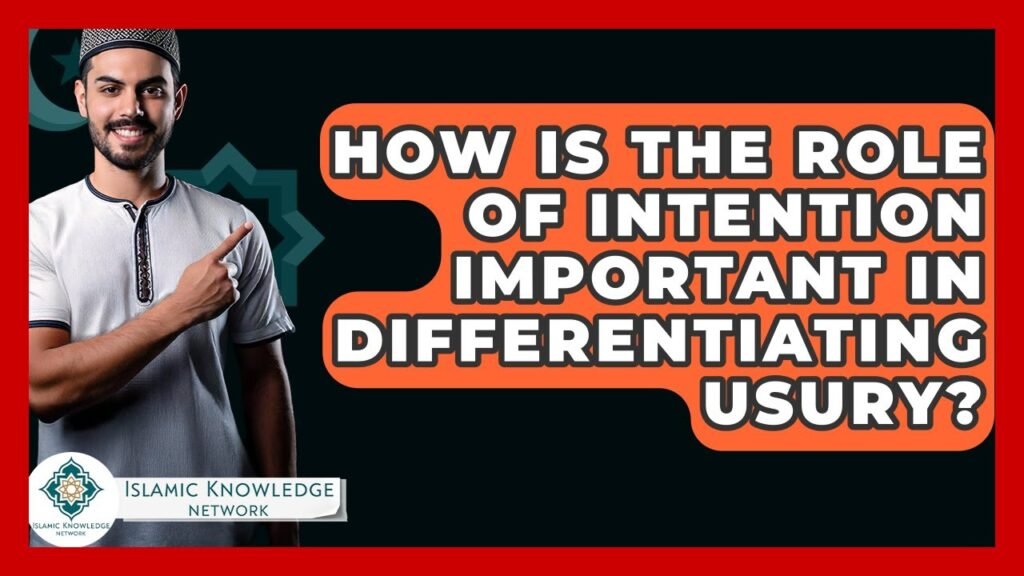Disclaimer:
The content published on this website is provided for general informational purposes only. Articles are generated with the assistance of artificial intelligence and are reviewed periodically; however, accuracy cannot be guaranteed in all cases. Readers are encouraged to verify important information from reliable and authoritative sources before relying on it. The website does not intend to mislead, and any errors found will be corrected when identified.
How Is The Role Of Intention Important In Differentiating Usury? – Islamic Knowledge Network
In the intricate landscape of Islamic finance, the concept of usury, or "riba," has long been a contentious issue. Integral to understanding it is the role of intention, or "niyyah," which serves as a vital criterion in distinguishing permissible financial practices from those deemed exploitative. This exploration delves into how intention shapes our financial interactions and aligns them with ethical principles outlined in Islamic teachings. By grounding our financial decisions in sincere intention, individuals can navigate the complexities of monetary transactions without falling into the trap of usury.
At Airlink Hajj and Umrah, we recognize that deepening your knowledge of Islamic principles not only enhances your spiritual journey but also supports sound financial decision-making. Our blog features comprehensive updates on Hajj and Umrah, enriching your understanding of these sacred practices alongside critical insights into Islamic finance. As we explore the pivotal role of intention in differentiating usury, we aim to provide you with the knowledge needed to act ethically and responsibly in all aspects of life, especially during your holy pilgrimage.
How Does Intention Differentiate Usury in Islamic Finance?
In Islamic finance, the concept of intention plays a pivotal role in distinguishing between permissible profit and usury, or riba. Usury, strictly prohibited in Islam, involves any guaranteed return on loans, often leading to exploitation of borrowers. However, the principle of intention emphasizes ethics and morality in financial dealings. When the intention behind a transaction is to support or assist rather than to exploit, it aligns with Islamic financial principles, fostering a fair and just economic environment.
The notion of niyyah (intention) is deeply rooted in Islamic teachings and reflects one’s commitment to transparency and ethical practices. For instance, if a lender provides a loan expecting to help the borrower stabilize their financial situation, the transaction is viewed more favorably than one driven solely by the intent of profit maximization. This ethical framework guides financial interactions, ensuring they resonate with Islamic values while promoting community welfare.
Understanding this differentiation is crucial for those involved in Islamic finance. As we continuously update our blog with insights related to Hajj and Umrah, we strive to integrate broader financial education, helping our readers navigate the complexities of Islamic finance in their spiritual and financial journeys.
FAQ on How Does Intention Differentiate Usury in Islamic Finance?
FAQ 1: What is the definition of usury in Islamic finance?
Usury, or "riba," refers to the practice of charging excessive interest on loans, which is prohibited in Islamic finance. It is viewed as exploitative and unjust.
FAQ 2: How does intention play a role in distinguishing usury from permissible transactions?
Intention is crucial in Islamic finance; if a transaction aims to promote fairness and mutual benefit without exploiting the parties involved, it may not be considered usury, even if a profit is made.
FAQ 3: Can profit be earned without it being considered usury in Islamic finance?
Yes, profit can be earned through ethical investments and partnerships as long as the intention is to create value and support economic productivity rather than exploiting borrowers.
FAQ 4: What are the implications of a lack of intention in financial dealings?
Without a clear, ethical intention, a financial transaction may be classified as usury, leading to potential religious and legal consequences for the parties involved.
FAQ 5: How can individuals ensure their financial practices align with Islamic principles?
Individuals can educate themselves on Islamic finance principles, consult with knowledgeable scholars, and focus on collaborative, equitable financial arrangements that promote social welfare.
Mushu, an experienced Saudi Arabia traveler and writer, shares insightful tips and spiritual reflections to enhance Hajj and Umrah journeys for fellow pilgrims. He has been to Makkah and Madina from 2016 to 2023 many times and his posts will reflect this.







